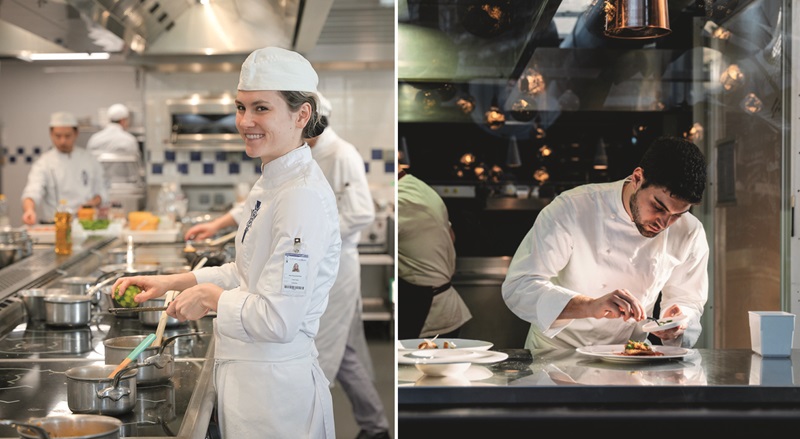-
Locations
Campuses in Europe & Middle EastCampuses in The AmericasCampuses in AsiaLe Cordon Bleu International
- Online Learning
Contact your local representative - Our Story
- Programmes
- Brochures
- News & Events
- Contact
- Find Course

A chef de partie occupies a key position in a kitchen brigade as they are responsible for an entire sector. They are responsible for fish, meat, patisseries or sauces, and for plating dishes.
They also manage stocks and supplies in their sector. They place the necessary orders to avoid any product shortages. In addition to these tasks, they organise and supervise the work of commis and apprentices. Their role is to ensure production in the kitchen runs smoothly.
A good chef de partie knows how to delegate. They distribute tasks while ensuring that their brigade is well trained. They must also adapt their recipes to respond to customer feedback and special requests (special diets, allergies, etc.). Their work is constantly evolving in line with the seasons and culinary trends.Mastering culinary techniques is essential to becoming a chef de partie. You must be able to prepare dishes with precision and speed to keep up with the pace without compromising quality. Creativity is also a key quality, as it allows you to create innovative dishes and surprise your customers!
In the kitchen, every minute counts. A chef de partie must have good organisational skills. They must be able to manage several preparations at the same time without getting overwhelmed. Discipline and attention to detail are their best allies.A chef de partie must communicate effectively with their colleagues and subordinates to avoid any unpleasantness. A good working atmosphere contributes to the success of the whole brigade.
Finally, good stress management is a major asset. Working hours are often long and the pace fast, especially during busy periods. A chef de partie must remain calm and concentrated at all times.Le Cordon Bleu Paris institute programmes provide high quality, comprehensive training. A training programme at Le Cordon Bleu Paris opens the doors to the most prestigious kitchens.
Le Cordon Bleu institute Diplôme de Cuisine is a world-renowned programme. It is divided into three levels: Basic, Intermediate and Superior. Each level prepares students to master fundamental French cuisine techniques.
In basic level, students learn cutting techniques, basic cooking methods and classic recipes thanks to a complete immersion in the culinary arts. They acquire the rudimentary skills needed to start their career.
Intermediate level encourages students to perfect their techniques. They tackle more complex recipes and learn to manage everyday situations in the kitchen.
In superior level, the students learn the cutting-edge techniques used in Michelin-starred kitchens. They are expected to create sophisticated dishes and demonstrate great mastery. This level prepares future chefs to excel in demanding environments.The Diplôme de Pâtisserie is similar in structure to the Diplôme de cuisine. It is also made up of three levels: Basic, Intermediate and Superior.
In basic level, students learn the fundamentals of French patisserie. They make tarts, entremets, choux pastries and other famous desserts. This is a discovery of basic techniques and common ingredients.
Intermediate level introduces more advanced techniques. Students work on more complex desserts, such as multi-layered entremets and refined fillings. They really begin to develop their own style and hone their skills.
In superior level, they perfect their techniques and learn to create high-quality desserts. They must demonstrate great precision and flawless creativity. This level prepares them to work in the best patisseries in the world.Au niveau supérieur, ils perfectionnent leurs techniques et apprennent à créer des desserts de haute qualité. Ils doivent démontrer une grande précision et une créativité sans faille. Ce niveau les prépare à travailler dans les meilleures pâtisseries du monde.Copyright © 2025 Le Cordon Bleu International B.V. All Rights Reserved.